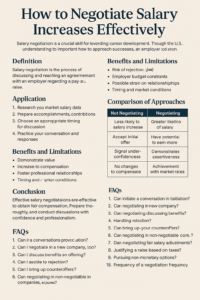Introduction
Negotiating a salary increase can be daunting, but it is a crucial skill for career advancement. In the United States, employees are often expected to advocate for their worth, making it essential to understand negotiation strategies. Whether you are seeking a raise in your current role or negotiating a new job offer, mastering this process can significantly impact your financial well-being.
Index
- Definition of Salary Negotiation
- Application of Salary Negotiation Techniques
- Benefits of Effective Salary Negotiation
- Limitations and Challenges
- Comparative Sheet: Effective vs. Ineffective Negotiation
- Conclusion
- 10 Frequently Asked Questions
Definition of Salary Negotiation
Salary negotiation is the process of discussing and reaching an agreement with an employer regarding compensation. This negotiation can occur during the hiring process, performance reviews, or when an employeeﻗs responsibilities expand beyond their original job description. It involves presenting evidence of oneﻗs value and making a compelling case for increased pay.
Application of Salary Negotiation Techniques
To negotiate a salary effectively, consider these key strategies:
- Research Market Value ﻗ Use resources like Glassdoor, Payscale, and the Bureau of Labor Statistics to determine the industry-standard salary for your role.
- Assess Your Performance and Contributions ﻗ Highlight your accomplishments, skills, and how youﻗve added value to the company.
- Time Your Request Wisely ﻗ Aim for a time when the company is performing well financially or after youﻗve achieved a significant milestone.
- Be Prepared to Justify Your Request ﻗ Provide concrete data and examples of your contributions that justify a higher salary.
- Practice Your Pitch ﻗ Role-play your negotiation conversation to refine your approach and boost confidence.
- Consider Additional Benefits ﻗ If a salary increase is not feasible, negotiate perks like bonuses, stock options, remote work, or professional development support.
- Be Professional and Confident ﻗ Maintain a positive attitude and be open to counteroffers or alternative compensation options.
- Know When to Walk Away ﻗ If the offer does not meet your needs, be prepared to explore other opportunities.
Benefits of Effective Salary Negotiation
Negotiating a salary increase effectively provides numerous advantages:
- Higher Earnings ﻗ Maximizing your salary leads to better financial stability.
- Career Advancement ﻗ A raise often reflects professional growth and increased responsibilities.
- Increased Job Satisfaction ﻗ Feeling valued can enhance work motivation and job performance.
- Improved Workplace Relationships ﻗ Open conversations about compensation build trust with employers.
- Greater Financial Security ﻗ Higher income allows for better investment, savings, and debt management.
Limitations and Challenges
While salary negotiation is beneficial, there are some limitations:
- Company Budget Constraints ﻗ Employers may have limited funds for raises.
- Market Conditions ﻗ Economic downturns can make negotiations challenging.
- Fear of Rejection ﻗ Employees may hesitate to negotiate due to fear of damaging relationships.
- Workplace Culture ﻗ Some organizations discourage salary discussions.
- Legal and Contractual Restrictions ﻗ Employment contracts may restrict negotiation flexibility.
Comparative Sheet: Effective vs. Ineffective Salary Negotiation
| Factor | Effective Negotiation | Ineffective Negotiation |
|---|---|---|
| Preparation | Conducts thorough research on salary trends | Fails to research industry salary benchmarks |
| Confidence | Communicates assertively and professionally | Shows hesitation or uncertainty |
| Justification | Provides clear examples of value addition | Lacks evidence to support raise request |
| Flexibility | Considers alternative compensation benefits | Demands a fixed amount without compromise |
| Timing | Chooses an appropriate time for discussion | Requests a raise during company downturn |
| Attitude | Maintains a positive and collaborative tone | Uses aggressive or confrontational approach |
Conclusion
Salary negotiation is a critical career skill that empowers employees to secure fair compensation for their work. By researching, preparing, and effectively communicating your value, you can increase your earning potential while maintaining strong professional relationships. While challenges exist, understanding the process and being adaptable can lead to successful outcomes.
ﺡ FAQs.
- How often should I ask for a salary increase?
- Typically, once a year during performance reviews or after achieving significant accomplishments.
- What if my employer refuses my request?
- Politely ask for feedback and explore other benefits or a future review date.
- Should I reveal my current salary when negotiating a new job offer?
- Itﻗs best to focus on market value and your expectations rather than disclosing past salaries.
- How do I negotiate salary increases in a startup or small business?
- Be open to equity, bonuses, or flexible work arrangements if the company has budget constraints.
- Can I negotiate a salary increase remotely?
- Yes, virtual negotiations should be well-prepared, with clear communication via email or video call.
- Is it better to negotiate salary via email or in person?
- In-person or video calls are generally more effective, as they allow for real-time discussion.
- Whatﻗs a reasonable percentage increase to request?
- Typically, 3-10% is reasonable, but it depends on industry norms and performance.
- What should I do if my employer offers a lower increase than expected?
- Negotiate other perks like extra vacation days, remote work, or professional development.
- How do I counter a low salary offer in a job interview?
- Express gratitude, present market research, and propose a higher figure with justification.
- What if I feel uncomfortable negotiating?
- Practice with a mentor or career coach, and remind yourself that negotiation is a standard workplace practice.
By applying these strategies, you can effectively navigate salary negotiations and secure the compensation you deserve.

For further details access our website https://vibrantfinserv.com/
To visit: https://www.mca.gov.in/
Contact:ﺡ ﺡ ﺡ ﺡ 8130555124, 8130045124
Whatsapp:ﺡ ﺡ https://wa.me/918130555124
Mail ID:ﺡ ﺡ ﺡ ﺡ ﺡ ﺡ operations@vibrantfinserv.com
Web Link:ﺡ ﺡ ﺡ https://vibrantfinserv.com
FB Link:ﺡ ﺡ ﺡ ﺡ ﺡ ﺡ https://fb.me/vibrantfinserv

